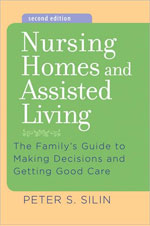Abuse in Nursing Homes
In todays Vancouver Province, there was an article by Peter Clough about Judy Sellin, whose father was in a nursing home. concerned about abuse, she put a hidden camera in the room, and filmed some powerful evidence that some B.C. seniors are neglected and even abused in an overburdened system."
In my book, Nurisng Homes: The Family's Journey, I spend quite a bit of time talking about abuse. I couldn't decide, when I was writing the book, if I should put it in, because it frightened people, but then I thought, better they should be forewarned."
Building up trust in a nursing home or care facility is hard anyway--it means leaving your loved one with people you don't know. It is harder still because of the emotions of guilt, shame, regeret, grief that accompany the decision. These feelings can colour what we think and feel.
First however, understand that most staff are caring and professional people doing a hard job in a difficult situation. They would no more abuse your mother, father, husband, wife, etc, than they would their own. Mostly, they spend their own money, work overtime, burn out on caring. Support them, and you will have supportive staff.
However----------- it makes sense to be aware. It makes sense to know that staff really are stressed out and stretched out.'Understand that the care aides have had their pay and benefits cut.
But-------know the signs of abuse. Know what good care is about. Go visit at different times. Talk to residents and other family members. Make sure the staff know you are around. Understand how nursing homes work. Learn about aging. Trust your intuition--but temper it with looking at your self. Use a hidden camera if you wish
In my lectures to the public, and to business, I always stress that the "job "of family members is to be an advocate and to be a nexpert on care.



